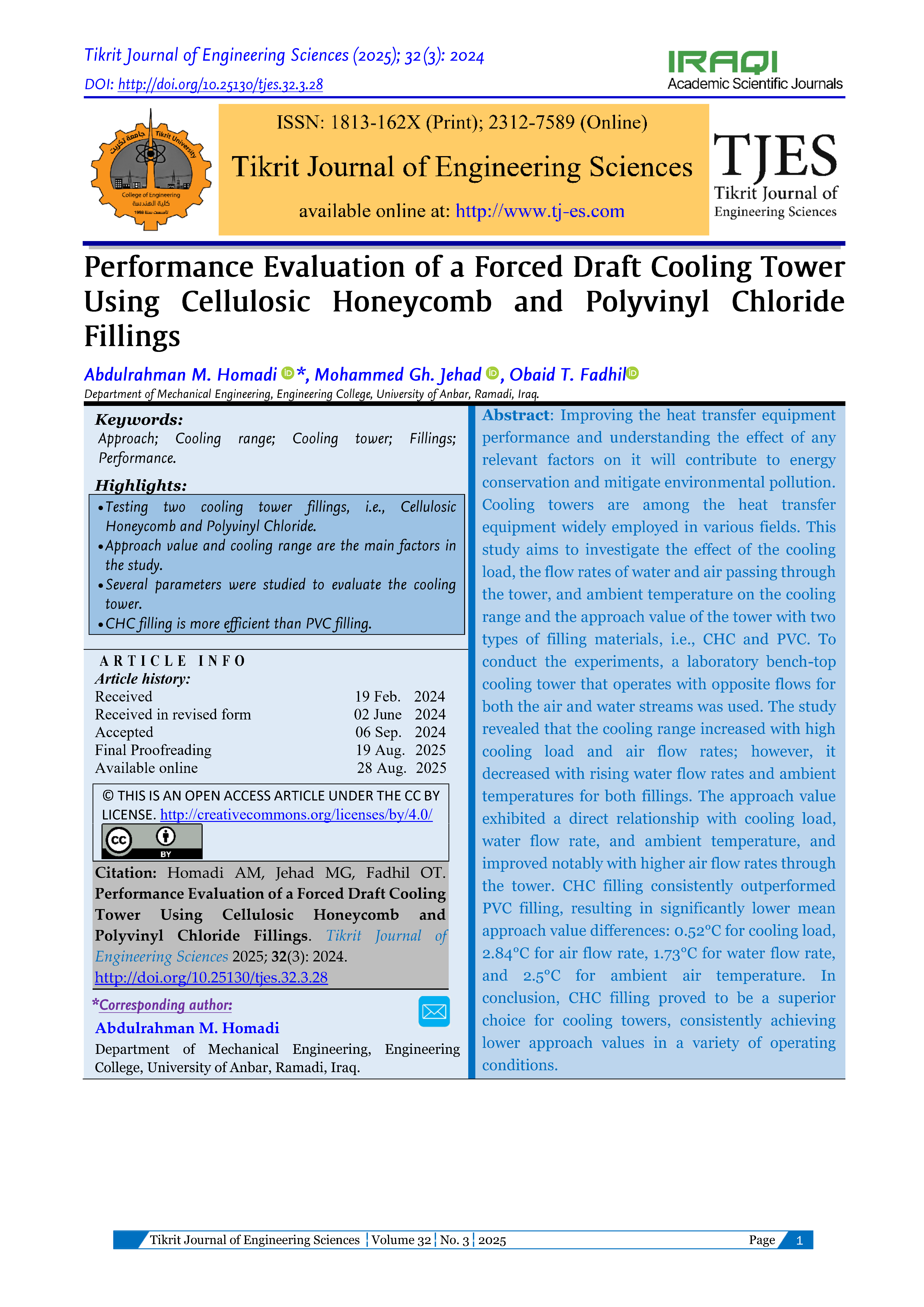Performance Evaluation of a Forced Draft Cooling Tower Using Cellulosic Honeycomb and Polyvinyl Chloride Fillings
محتوى المقالة الرئيسي
الملخص
Improving the heat transfer equipment performance and understanding the effect of any relevant factors on it will contribute to energy conservation and mitigate environmental pollution. Cooling towers are among the heat transfer equipment widely employed in various fields. This study aims to investigate the effect of the cooling load, the flow rates of water and air passing through the tower, and ambient temperature on the cooling range and the approach value of the tower with two types of filling materials, i.e., CHC and PVC. To conduct the experiments, a laboratory bench-top cooling tower that operates with opposite flows for both the air and water streams was used. The study revealed that the cooling range increased with high cooling load and air flow rates; however, it decreased with rising water flow rates and ambient temperatures for both fillings. The approach value exhibited a direct relationship with cooling load, water flow rate, and ambient temperature, and improved notably with higher air flow rates through the tower. CHC filling consistently outperformed PVC filling, resulting in significantly lower mean approach value differences: 0.52°C for cooling load, 2.84°C for air flow rate, 1.73°C for water flow rate, and 2.5°C for ambient air temperature. In conclusion, CHC filling proved to be a superior choice for cooling towers, consistently achieving lower approach values in a variety of operating conditions.
تفاصيل المقالة
القسم

هذا العمل مرخص بموجب Creative Commons Attribution 4.0 International License.
THIS IS AN OPEN ACCESS ARTICLE UNDER THE CC BY LICENSE http://creativecommons.org/licenses/by/4.0/
المراجع
Fisenko SP, Brin AA, Petruchik AI. Evaporative Cooling of Water in a Mechanical Draft Cooling Tower. International Journal of Heat and Mass Transfer 2004; 47(1):165-177.
Ning T, Chong D, Jia M, Wang J, Yan J. Experimental Investigation on the Performance of Wet Cooling Towers with Defects in Power Plants. Applied Thermal Engineering 2015; 78:228-235.
Rahmati M, Alavi SR, Tavakoli MR. Experimental Investigation on Performance Enhancement of Forced Draft Wet Cooling Towers with Special Emphasis on the Role of Stage Numbers. Energy Conversion and Management 2016; 126:971-981.
Alavi SR, Rahmati M. Experimental Investigation on Thermal Performance of Natural Draft Wet Cooling Towers Employing an Innovative Wind-Creator Setup. Energy Conversion and Management 2016; 122:504-514.
He S, Xu Y, Zhang G, Hooman K, Gao M. Selection of Wetted Media for Pre-Cooling of Air Entering Natural Draft Dry Cooling Towers. Applied Thermal Engineering 2017; 114:857-863.
Naik BK, Muthukumar P. A Novel Approach for Performance Assessment of Mechanical Draft Wet Cooling Towers. Applied Thermal Engineering 2017; 121:14-26.
Zengin G, Onat A. Experimental and Theoretical Analysis of Mechanical Draft Counter Flow Wet Cooling Towers. Science and Technology for the Built Environment 2020; 27(1):14-27.
Shublaq M, Sleiti AK. Experimental Analysis of Water Evaporation Losses in Cooling Towers Using Filters. Applied Thermal Engineering 2020; 175:115418.
Kumar R, Shrivastava Y, Maheshwari RR, Singh D. Natural Draft Cooling Tower: Analytic Study for Performance Enhancement. Materials Today: Proceedings 2020; 38:211-217.
Miao J, He S, Lu Y, Wu Y, Wu X, Zhang G, Gao M, Geng Z, Zhang S. Comparison on Cooling Performance of Pre-Cooled Natural Draft Dry Cooling Towers Using Nozzles Spray and Wet Medium. Case Studies in Thermal Engineering 2021; 27:101274.
Zhang D, Chen R, Zhang Z, He S, Gao M. Cross Wind Influence on Heat and Mass Transfer Performance for Wet Cooling Tower Equipped with an Axial Fan. Case Studies in Thermal Engineering 2021; 27:101259.
Dong P, Li X, Yu Y, Zhang Z, Feng J. Direct Air Capture via Natural Draft Dry Cooling Tower. International Journal of Greenhouse Gas Control 2021; 109:103375.
Dmitriev AV, Madyshev IN, Kharkov VV, Dmitrieva OS, Zinurov VE. Experimental Investigation of Fill Pack Impact on Thermal-Hydraulic Performance of Evaporative Cooling Tower. Thermal Science and Engineering Progress 2021; 22:100835.
Dai Y, Lu Y, Klimenko AY, Wang Y, Hooman K. Numerical Investigation of Swirl Effects on a Short Natural Draft Dry Cooling Tower Under Windless and Crosswind Conditions. Applied Thermal Engineering 2021; 188:116628.
Khamooshi M, Anderson TN, Nates RJ. A Numerical Study on Interactions Between Three Short Natural Draft Dry Cooling Towers in an In-Line Arrangement. International Journal of Thermal Sciences 2021; 159:106505.
Rahmati M. Effects of ZnO/Water Nano Fluid on the Thermal Performance of Wet Cooling Towers. International Journal of Refrigeration 2021; 131:526-534.
Shirazi M, Jahangiri A. 3D Numerical Study Using Three Novel Windbreak Walls in Natural Draft Dry Cooling Towers for Performance Enhancement Under Various Crosswind Conditions. Thermal Science and Engineering Progress 2021; 25:100971.
Peng W, Sadaghiani OK. Presentation of an Integrated Cooling System for Enhancement of Cooling Capability in Heller Cooling Tower with Thermodynamic Analyses and Optimization. International Journal of Refrigeration 2021; 131:786-802.
Solomon GR, Balaji R, Ilayaperumal K, Chellappa B. Performance Analysis and Efficiency Enhancement of Cooling Tower in 210 MW Thermal Unit. Journal of Physics: Conference Series 2021; 2054(1):012062.
Hassab MA, Mansour MK, Sadek LA, Qassem MA. Experimental Analysis of Cross-Flow Closed Cooling Tower. Alexandria Engineering Journal 2023; 69:739-746.
Patience GS. Experimental Methods and Instrumentation for Chemical Engineers. 2nd ed. Amsterdam: Elsevier; 2018.
Hilton PA. Experimental Operating and Maintenance Manual of Bench Top Cooling Tower H891. P.A. Hilton LTD; Hampshire, England: 1988.
Stanford HW. HVAC Water Chillers and Cooling Towers Fundamentals, Application, and Operation. 2nd ed. New York: CRC Press; 2016.





